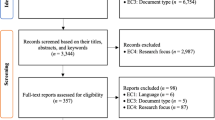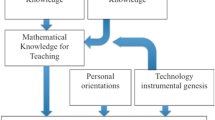Abstract
Many mathematics teachers around the world teach in a language different from the one in which they studied or completed their teacher education. Often these teachers must learn both the registers of mathematics and of mathematics education to teach in the additional language. This paper examines the factors that help teachers to learn these registers in Māori, the Indigenous language of New Zealand. Many of these teachers are second-language learners of the Māori language and attended English-medium schools and teacher-education programmes. After a brief discussion about the key role of language in teaching mathematics, this paper examines data from teachers at two Māori-immersion schools and a professional development facilitator. The analysis provides initial understanding of the factors that support or hinder their learning of the mathematics registers. Finally, a research agenda is suggested for further investigation of this issue.




Similar content being viewed by others
References
Austin, J. L., & Howson, A. G. (1979). Language and mathematical education. Educational Studies in Mathematics, 10(2), 161–197.
Bakalevu, S. L. (1999). The language factor in mathematics education. Directions Journal of Educational Studies No. 41, 21(2), 59–68.
Benton, R. A. (1991). The Maori language: dying or reviving?. Honolulu: East West Centre Association, University of Hawaii.
Bull, T. (2002). The Sámi languages, maintenance and intellectualisation. Current Issues in Language Planning, 3(1), 28–39.
Chitera, N. (2011). Language of learning and teaching in schools: an issue for research in mathematics teacher education? Journal of Mathematics Teacher Education, 14(3), 231–246.
Christensen, I. (2003). Exploring issues in mathematics education. Wellington: Ministry of Education.
Clarkson, P. C. (2004). Teaching mathematics in multilingual classrooms: the global importance of contexts. In I. P. Cheong, H. S. Dhindsa, I. J. Kyeleve, & O. Chukwu (Eds.), Globalisation trends in science, mathematics and technical education (pp. 9–23). Brunei: Universiti Brunei Darussalam.
Cleghorn, A. (1992). Primary level science in Kenya: constructing meaning through English and indigenous languages. International Journal of Qualitative Studies in Education, 5(4), 311–323.
Cuevas, G. J. (1984). Mathematics learning in English as a second language. Journal for Research in Mathematics Education, 15(2), 134–144.
Favilli, F., & Jama Musse, J. (1996). Creating a mathematical terminology: The Somalia case. Paper presented at ICME-8, Seville, Spain.
Fishman, J. (1991). Reversing language shift: theoretical and empirical foundations of assistance to threatened languages. Clevedon: Multilingual Matters.
Fullerton, O. (1995). Using talk to help learn mathematics. English Quarterly, 27(4), 10–17.
Grant, S. G., & Peterson, P. L. (1996). Learning to teach mathematics in the context of systemic reform. American Educational Research Journal, 33(2), 509–541.
Halai, A. (2007). Learning mathematics in English medium classrooms in Pakistan: implications for policy and practice. Bulletin of Education & Research, 29(1), 1–15. http://ecommons.aku.edu/pakistan_ied_pdck/83. Accessed 21 July 2014.
Halliday, M.A.K. (1974). Some aspects of sociolinguistics. In UNESCO (ed.), Interactions between linguistics and mathematics education: Final report. Nairobi, Kenya: UNESCO. http://unesdoc.unesco.org/images/0001/000149/014932eb.pdf. Accessed 21 July 2014.
Halliday, M. A. K. (1978). Language as social semiotic. London: Edward Arnold.
Halliday, M. A. K., & Hasan, R. (1985). Language, context and text: aspects of language in a social-semiotic perspective. Melbourne: Deakin University Press.
Halliday, M. A. K., & Martin, J. R. (1993). Writing science: literacy and discursive power. Pittsburgh: University of Pittsburgh Press.
Horn, I. S. (2005). Learning on the job: a situated account of teacher learning in high school mathematics departments. Cognition and Instruction, 23(2), 207–236.
Hornberger, N. (2002). Multilingual language policies and the continua of biliteracy: an ecological approach. Language Policy, 1(1), 27–51.
Khisty, L. L., & Chval, K. B. (2002). Pedagogic discourse and equity in mathematics: when teachers’ talk matters. Mathematics Education Research Journal, 14(3), 154–168.
Liddicoat, A. J., & Bryant, P. (2002). Intellectualisation: a current issue in language planning. Current Issues in Language Planning, 3(1), 1–4.
Meaney, T., Trinick, T., & Fairhall, U. (2009). The conference was awesome: social justice and a mathematics teacher conference. Journal of Mathematics Teacher Education, 12(6), 445–460.
Meaney, T., Trinick, T., & Fairhall, U. (2012). Collaborating to meet language challenges in indigenous mathematics classrooms. New York: Springer.
Mestre, J. P. (1988). The role of language comprehension in mathematics and problem solving. In R. R. Cocking & J. P. Mestre (Eds.), Linguistic and cultural influences on learning mathematics (pp. 201–220). Hillsdale: Lawrence Erlbaum.
Ministry of Education (2004). Te reo pāngarau. A Maori language dictionary of mathematics. Wellington: Learning Media.
Ministry of Education (2005). 2004 Teacher Census. Report on the findings of the 2004 Teacher Census. Wellington: Demographic and Statistical Analysis Unit, Ministry of Education. http://educationcounts.govt.nz/publications/schooling/teacher_census. Accessed 21 July 2014.
Ministry of Education. (2008). The number framework. Wellington: Learning Media.
Ministry of Education. (2010). Te reo pāngarau. A Maori language dictionary of mathematics (2nd ed.). Palmerston North: Print Consultants.
Ministry of Education (2013). Māori language in education. http://www.educationcounts.govt.nz/statistics/maori_education/schooling/6040. Accessed 21 July 2014.
Moschkovich, J. (2007). Bilingual mathematics learners: how views of language, bilingual learners and mathematical communication affect instruction. In N. S. Nasir & P. Cobb (Eds.), Improving access to mathematics (pp. 89–104). New York: Teachers College Press.
Murphy, H., McKinley, S., & Bright, N. (2008). Whakamanahia Te Reo Maori. He tirohanga Hotaka–An exploration of issues and influences that effect Te Reo Maori competences of graduates from Maori-medium programmes. Wellington: New Zealand Teachers Council.
Pimm, D. (1987). Speaking mathematically: Communication in mathematics classrooms. London: Routledge and Kegan Paul.
Raiker, A. (2002). Spoken language and mathematics. Cambridge Journal of Education, 32(1), 45–60.
Setati, M. (2008). Access to mathematics versus access to the language of power: the struggle in multilingual mathematics classrooms. South African Journal of Education, 28(1), 103–116.
Skerrett, M. (2011). Whakamanahia Te Reo Māori: He tirohanga rangahau: A review of literature on the instructional and contextual factors likely to influence Te Reo Māori proficiency of graduates from Māori medium ITE programmes. Wellington: Teachers Council.
Spolsky, B. (2003). Reassessing Māori regeneration. Language in Society, 32(4), 553–578.
Trinick, T. (2014). Te Reo tatai: Issues in the modernising of te reo Māori to teach mathematics. Unpublished doctoral dissertation, Waikato University, Hamilton, NZ (Forthcoming).
Tuckman, B. W. (1999). Conducting educational research (5th ed.). Fort Worth: Harcourt Brace.
Veel, R. (1999). Language, knowledge and authority in school mathematics. In F. Christie (ed.), Pedagogy and the shaping of consciousness: Linguistic and social processes (pp. 185–216). London: Continuum.
Author information
Authors and Affiliations
Corresponding author
Rights and permissions
About this article
Cite this article
Trinick, T., Meaney, T. & Fairhall, U. Teachers learning the registers of mathematics and mathematics education in another language: an exploratory study. ZDM Mathematics Education 46, 953–965 (2014). https://doi.org/10.1007/s11858-014-0618-7
Accepted:
Published:
Issue Date:
DOI: https://doi.org/10.1007/s11858-014-0618-7




